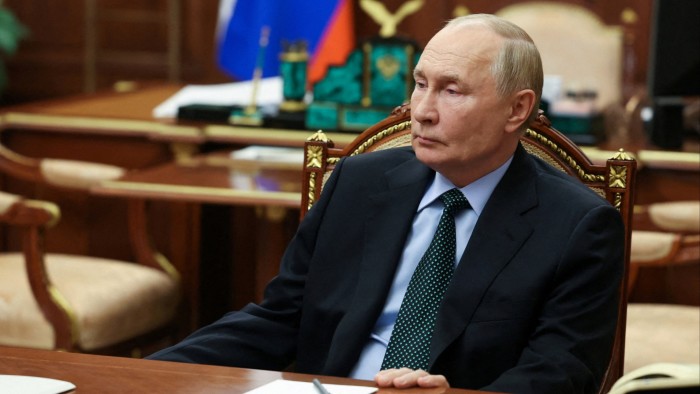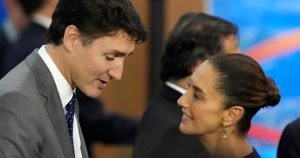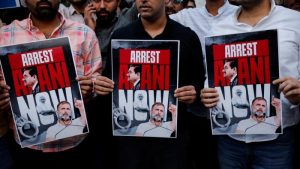Should Europe be spooked by Putin’s new nuclear brinkmanship?

This article is an on-site version of our Europe Express newsletter. Premium subscribers can sign up here to get the newsletter delivered every weekday and Saturday morning. Standard subscribers can upgrade to Premium here, or explore all FT newsletters
Good morning. Are we all one step closer to world war three? Vladimir Putin certainly wants us to think so. I unpack the implications of his change to the Kremlin’s nuclear doctrine and the start of Ukraine’s use of American long-range missiles against Russian targets.
And our climate correspondent reports on the fight between EU capitals and the European parliament over the bloc’s controversial deforestation law.
Annihilation games
Vladimir Putin upped the nuclear ante once again yesterday by allowing for an atomic strike on western powers supplying weapons to Ukraine, in what officials said was a high-stakes test of the resolve of Kyiv’s allies.
Context: Putin changed Russia’s official military doctrine to lower the threshold for using nuclear weapons. The update means attacks by advanced western weapons such as the US long-range Atacms missiles would justify a nuclear strike in response, and that an attack by a non-nuclear state supported by a nuclear power is considered a joint assault.
That came within hours of Ukraine striking a target inside Russia with Atacms for the first time — less than two days after US President Joe Biden ended his veto on such use of the weapons by Kyiv.
The Kremlin’s spokesman made a vague attempt to deny the obvious coincidence, and implied the new doctrine expanded the possible options without being binding.
But other Russian officials were more stark. “Without the Americans, it is impossible to use these high-tech missiles,” said foreign minister Sergei Lavrov, calling their use “a signal that [the west] wants escalation”.
Western officials largely rejected the blackmail.
“Any call for nuclear warfare is an irresponsibility,” said Josep Borrell, the EU’s chief diplomat, after a meeting of EU defence ministers that discussed the issue. “It is not the first time that Putin plays the nuclear game.”
Ukrainians using Atacms to hit military targets in Russia “is in accordance with the rule of law, international law”, Borrell added.
Some pointed out that if Putin’s new rules were to be taken seriously, the Atacms strikes meant he wouldn’t be threatening to use a nuclear weapon, but actually firing one.
More likely, others suggested, Russia would respond to the US missile policy shift with even more so-called hybrid attacks in Europe, such as hard-to-attribute arson, sabotage or potential support for proxies. France, Germany, Italy, Poland, Spain and the UK yesterday jointly accused Russia of “systematically attacking European security architecture”.
Still, investors were spooked by the nuclear willy-waving. Germany’s Dax and France’s Cac 40 index both fell 0.7 per cent, while safe-haven assets such as gold, the Swiss Franc and US 10-year bonds all rose.
“There were a few bleak-looking faces around the table,” said one senior official present at the G20 leaders’ summit in Rio, in response to Putin’s announcement. “Fair, given we were essentially discussing the potential end of the world.”
Chart du jour: Sabotage
Swedish investigators probing the severing of two Baltic Sea cables are studying the movements of a Chinese ship that passed both locations on its journey from Russia.
Risky business
The EU’s biggest political group tried to take an axe to the bloc’s landmark deforestation law. But member states are fighting back, writes Alice Hancock.
Context: A law banning commodities grown on deforested land from being sold in the EU was meant to come into force at the end of this year. But amid businesses’ confusion about the rules and pushback from trading partners, the European Commission has proposed a one-year delay.
The centre-right European People’s party used a vote in the European parliament on the delay last week to further amend the law, with the help of far-right parties. The amendments would in effect exempt most EU member states from complying with the rules — to the dismay of countries around the world.
EU ambassadors meeting today, however, are likely to throw out the EPP’s amendment, not least because there is scant detail about how a newly introduced “no risk” category would work, and no confirmation of whether it would contravene international trade rules.
“[The] amendments are not content-oriented, but are just a pawn to show who has the say in the European parliament in the new legislative term,” a parliament official said.
Many member states support the commission’s proposed delay, but few have the appetite to “substantially amend the regulation” after it was already adopted, an EU diplomat said.
Germany, France, Spain, Belgium, Luxembourg, Denmark and Poland are among those against the “no risk” change.
The face-off could set the stage for the weeks to come as the EPP, the group of commission president Ursula von der Leyen, tries to dismantle parts of the EU’s environmental agenda.
With businesses clamouring for certainty, late changes may not be tolerated by capitals.
What to watch today
-
EU competition commissioner-designate Teresa Ribera appears before Spanish parliament.
-
EU chief diplomat Josep Borrell travels to Jordan.
Now read these
Recommended newsletters for you
Trade Secrets — A must-read on the changing face of international trade and globalisation. Sign up here
Swamp Notes — Expert insight on the intersection of money and power in US politics. Sign up here
Are you enjoying Europe Express? Sign up here to have it delivered straight to your inbox every workday at 7am CET and on Saturdays at noon CET. Do tell us what you think, we love to hear from you: [email protected]. Keep up with the latest European stories @FT Europe
#Europe #spooked #Putins #nuclear #brinkmanship





